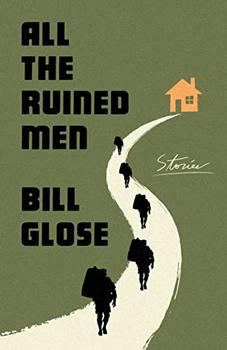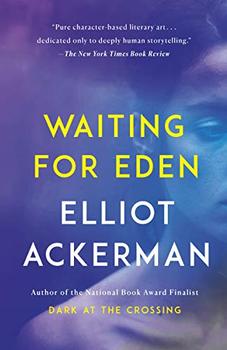Summary | Excerpt | Reading Guide | Reviews | Beyond the book | Read-Alikes | Genres & Themes | Author Bio

Winner of the 2014 National Book Award for Fiction
Is there any way a civilian can understand military life? And what about combat: can anyone, other than those who have lived it, ever relate? Such questions recur each time I read war literature, watch a classic film like Full Metal Jacket or talk with a veteran. For some reason, maybe selfish or maybe curious, I desperately want to understand – or at least relate to – what I hear and read from the people who do know. Phil Klay's short story collection, Redeployment, reassured me that this curiosity is okay. (Though it's subject matter is decidedly not reassuring.) My desire to comprehend the unnatural, exhilarating and disturbing events of war felt accepted and maybe even encouraged as I read the stories of this phenomenal writer and former member of the military.
Redeployment drew me into its pages readily: the appeal of seeing dissimilar concepts united and the satisfaction of experiencing the disproving of yet another cultural stereotype. Its stories are full of hard and soft edges, victories and losses, hubris and panic. The author, himself a Marine with a Dartmouth MFA, is a significant part of this real world dyad. What I think of as the traditional and narrow view of soldiers - the minimally educated, unthinking fighting machines - does not apply here.
War literature runs the gamut, from the paperback thriller with stock characters, to journalistic triumphs like Dexter Filkins' The Forever War, to Klay's work of art. And then there is the niche in war writing that is Marine Corps specific. Numerous characters and settings in Redeployment's stories reminded me of the standout memoir, Jarhead, by former Marine scout sniper Anthony Swofford, but Klay's collection is stronger in some ways. In choosing fiction, Klay has greater creative liberty, and in using short stories, he has the advantage of still greater variety – in locales, points of view and of course, characters. Redeployment communicates powerfully, articulating the experience of war from a diversity of viewpoints. Because of this wide-angle view, it seems like it should be required reading before any recruit becomes a soldier.
The narrator of my favorite story, "Prayer in the Furnace", is a military chaplain, a Catholic priest who doesn't pretend to have all the answers for the confused and angry Marines in Charlie Company who are making their way through the worst of Iraq round two. Through the eyes of the unnamed minister, war and the warriors who fight them are explored from every gritty angle – philosophical, spiritual, physical and mental. The priest's reflections contain a couple of my favorite lines in the book. In describing a squad at the conclusion of a memorial service for one of their own, he observes: "Geared up, Marines are terrifying warriors. In grief, they look like children." Later in the story, while reminiscing about an early-career ill-fated conversation with a grieving father, he recalls: "But platitudes are most appealing when they're least appropriate." With very few words, Klay's minister creates a precise, familiar mental picture, an admirable quality that appears to typify the author's style.
Another strength in Klay's stories lies in his ability to capture inane moments of modern life and relate them to the military experience. One example occurs during a scene in the penultimate story, "Unless it's a Sucking Chest Wound." The two main characters, Marine veterans, are drinking, trying to numb themselves. One of them has has experienced battle, the other has not. They start watching online helmet-cam videos of firefights in Afghanistan. As the conversation sways from how cool and video-game like the scenes are, to the question of whether the footage communicates what it is really like to be in combat, the mood changes. A random and incongruous "screenshot of some Japanese writing and a cartoon squid" appears amongst all the suggestions for similar clips, and the non-combatant Marine hyper-focuses on it as the dialogue between he and the other soldier grows awkward. What a strange and small observation, but such digital nonsense is something any reader who has used an online media tool like YouTube or Amazon will instantly recognize. And it is exactly the kind of bizarre thing we notice when our minds are overwhelmed with grief or violence.
I believe this book comes close to answering the question, "What is it like to be a Unites States Marine today?" and it might even answer the larger question, "What is it like to be a modern warrior?" For this reason, as well as for the sheer quality of the writing, let's hope that there's much more to come from Phil Klay. I would pick up any book – war literature or otherwise – with his name listed on the front. I just hope the next time he writes about the Marines, Klay gets to have a real one on his hardcover art rather than what is, as a ten-year veteran of the Marines pointed out to me, a soldier in an Army uniform.
![]() This review was originally published in The BookBrowse Review in May 2014, and has been updated for the
March 2015 edition.
Click here to go to this issue.
This review was originally published in The BookBrowse Review in May 2014, and has been updated for the
March 2015 edition.
Click here to go to this issue.

If you liked Redeployment, try these:

by Bill Glose
Published 2022
For readers of Phil Klay, Kevin Powers, and Tim O'Brien: Dramatic, powerful, authentic short stories of soldiers fighting a "forever war," in combat and back home.

by Elliot Ackerman
Published 2019
From the National Book Award finalist, a breathtakingly spare and shattering new novel that traces the intersection of three star-crossed lives.
To be ignorant of what occurred before you were born is to remain always a child
Click Here to find out who said this, as well as discovering other famous literary quotes!
Your guide toexceptional books
BookBrowse seeks out and recommends the best in contemporary fiction and nonfiction—books that not only engage and entertain but also deepen our understanding of ourselves and the world around us.